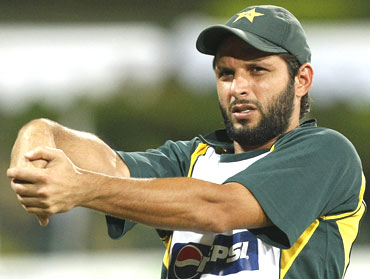
Pakistan all-rounder Shahid Afridi was banned on Sunday for two Twenty20 Internationals after pleading guilty to a ball tampering charge during the fifth and final ODI against Australia in Perth.
Soon after he was charged for ball tampering, he said all he was trying to do was to smell the ball. Coach Intikhab Alam wondered why he was acting "like eating an apple".
"It is unfortunate, he (Afridi) has accepted it that he should not have done it. It is unacceptable, it should not have happened - I feel sorry for him, being a captain you should be above everything," Alam said.
In his defence Afridi said he was just trying to smell the ball.
"I tried to smell it. There was some things on it that I tried to move," Afridi said in his defence.
In 2005, Afridi was banned for twisting his spikes and trying to change condition of pitch during a Test match in Faisalabad against England.
Read on for more instances of ball-tampering:
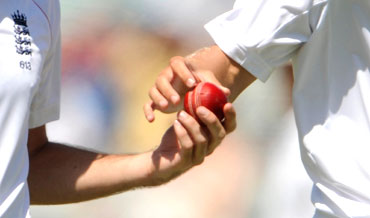
Jan 2010: South Africa vs England, Third Test, Newlands,
Last month, South Africa raised concerns with match referee Roshan Mahanama over allegations about ball being tampered while England were fielding on day three of the third Test.
Controversy broke out at Newlands after television cameras showed England seamer Stuart Broad trapping a straight drive with the sole of his boot, football style, and James Anderson was pictured working it with his fingers moments later.
Both pacemen denied wrong-doing and escaped an International Cricket Council reprimand. However, observers including former England captain Michael Vaughan criticised the pair.
Vaughan claimed Anderson was "lucky" to avoid a reprimand or a ban, claiming the Lancashire bowler deliberately attempted to alter the condition of the ball.
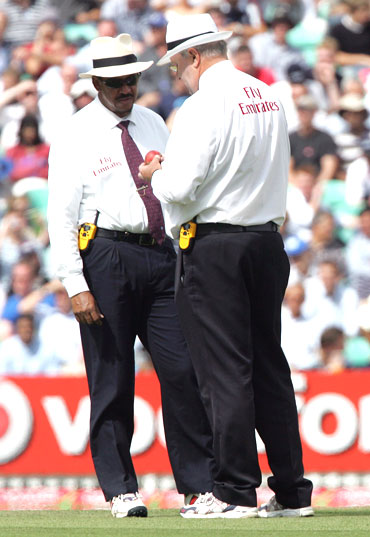
August 2006: England vs Pakistan, Fourth Test, The Oval
In August 2006, England were awarded the fourth and final Test after Pakistan forfeited the match on a day of high farce and bitter recriminations following a ball-tampering storm.
Pakistan refused to return to the field after tea on day four at The Oval after Darrell Hair and fellow-umpire Billy Doctrove had earlier imposed a five-run penalty against them for ball-tampering and changed the ball.
When Pakistan later took the field, the umpires did not appear, leading to extensive negotiations that ended with the match being abandoned almost six hours after the drama began.
But in July 2008 the International Cricket Council agreed in principle to alter the result to "match abandoned as a draw" from a forfeited win for Michael Vaughan's men.
However, cricket's ruling body restored the initial result of an England win last February, saying it made the decision after taking legal advice and receiving input from the Marylebone Cricket Club, the custodians of the Laws of Cricket, who said told the ICC it should never have changed the result and that it had set a dangerous precedent.
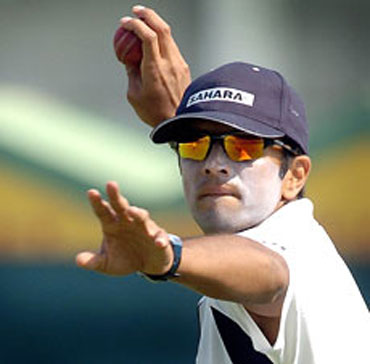
January 2004: India vs Zimbabwe, Tri-series, Gabba
ICC match referee Clive Lloyd found Rahul Dravid guilty of a Level 2 offence and imposed a Level 2 penalty of 50 percent of his match fee for breach of the ICC code of conduct.
The Indian vice-captain was charged under clause 2.10 of the code of conduct, which refers to changing the condition of the ball during the tri-series match against Zimbabwe at the Gabba in Brisbane on Tuesday.
India coach John Wright said, 'He was applying saliva to the ball and what happened was the saliva was coloured with that sweet [he was eating] and he wiped it off because he knew immediately it was only supposed to be saliva or perspiration.'
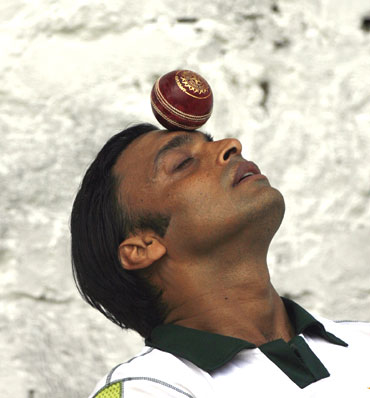
May 2003: Pakistan vs New Zealand, Tri-series, Dambulla
Pakistani paceman Shoaib Akhtar was handed a two-match ban for ball-tampering. The 'Rawalpindi Express' was reported to ICC match referee Gundappa Vishwanath after the one-day international against New Zealand in Dambulla. Third umpire Gamini Silva of Sri Lanka noticed him scratching the quarter seam of the ball on television replays and brought it to Vishwanath's attention.
November 2002: Zimbabwe vs Pakistan, first Test, Harare
Earlier, in November 2002 he was found guilty of ball-tampering during the first Test against Zimbabwe at Harare. ICC match referee Clive Lloyd said the umpires had reported the matter to him and there was agreement that Shoaib had changed the condition of the ball illegally.
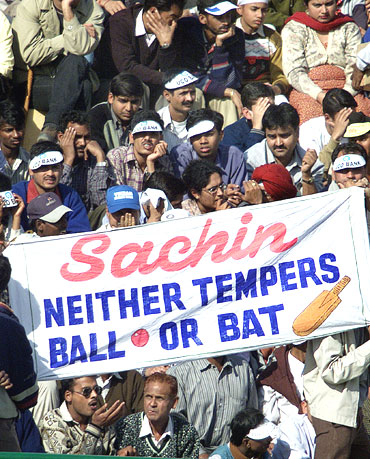
November 2001: India vs South Africa, Second Test, Port Elizabeth
Sachin Tendulkar was found guilty of ball-tampering during the Port Elizabeth Test and handed down a suspended one-match sentence and fined 75 per cent of his match fee by English match referee Mike Denness.
"I spoke to the two umpires as well and they said they didn't find anything to report. They didn't even warn anyone," United Cricket Board of South Africa Chief Executive Gerald Majola said about the incident.
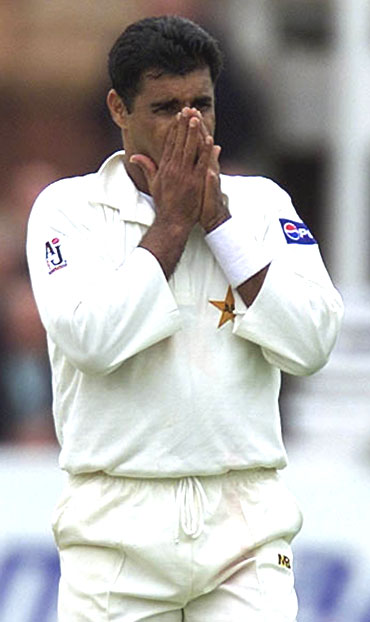
July 2000: Pakistan vs South Africa, Tri-series, Colombo
Waqar Younis was the first player to be suspended for a one-day international, by match referee John Reid.
Television images showed Waqar and teammate Azhar Mahmood scratching the ball and lifting the quarter seam in the ODI match against South Africa in Sri Lanka.
The former was also fined 50 per cent of his match fee, while Azhar was fined 30 per cent of his match fee.
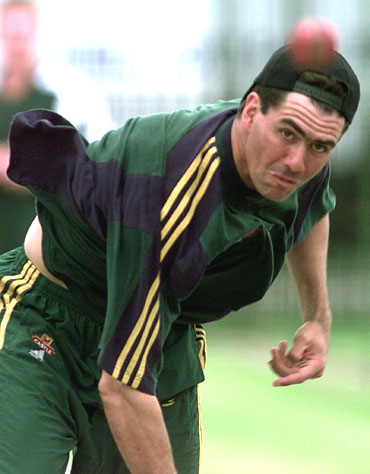
December 1997: Australia vs South Africa, Tri-series, Sydney
Australian players accused South African captain Hansie Cronje of ball-tampering during the Sydney ODI.
Cronje was cleared by match referee Cammie Smith.
Later, South African coach Bob Woolmer dismissed the allegation as an Australian ploy to demoralise the visiting team.
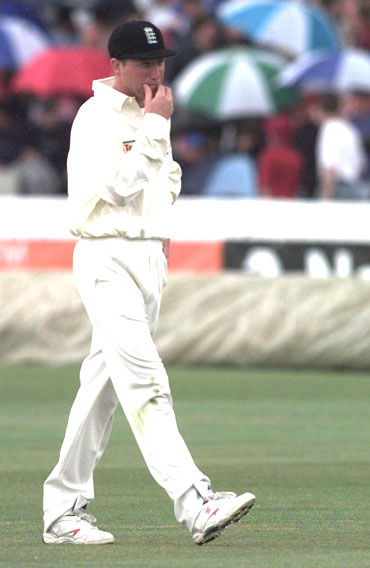
July 1994: England vs South Africa, First Test, Lord's
Mike Atherton was fined 2,000 pounds by match referee Peter Burge for the 'dirt in the pocket' incident in the Test against South Africa at Lord's.
Television footage showed the newly-appointed England captain apparently rubbing something to the ball. Atherton claimed he rubbed dirt from his pocket to aid grip on the ball.
"The dirt in my pocket was used to dry my fingers because it was a hot and humid day. We were trying to get the ball to reverse swing. You need one side of the ball to remain completely dry," Atherton said then.
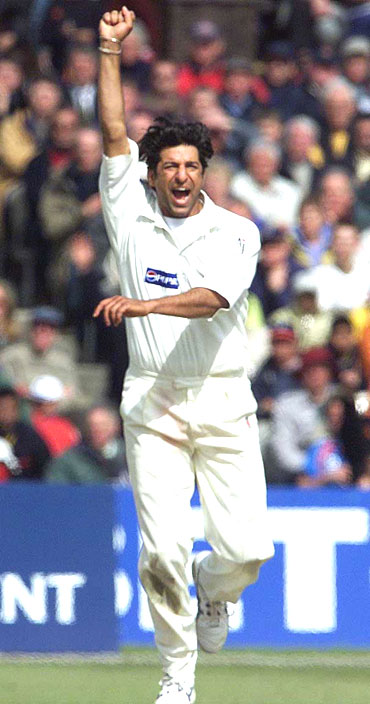
July 1992: Pakistan's tour of England
Pakistani bowlers Wasim Akram, Waqar Younis and Aaqib Javed were accused of ball-tampering during the team's tour of England. However, no action was taken against these players.
"I believe in fair play, and action must be taken against those cricketers who use foul tactics, whether it is Waqar or any other bowler around the world. I am not against Waqar or Wasim Akram but I know much more about ball-tampering. For Pakistan's sake, I don't want to add much," Pakistan captain Rashid Latif had said when he was out of the team a couple of years ago.